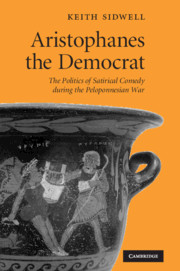Book contents
- Frontmatter
- Contents
- Detail of illustration
- Preface
- Acknowledgements
- List of abbreviations
- PART I SETTING THE STAGE
- PART II THE POETS' WAR
- 4 Acharnians: Parabasis versus play
- 5 Metacomedy, caricature and politics from Knights to Peace
- 6 Metacomedy, caricature and politics from Autolycus to Frogs
- Conclusions and consequences
- PART III APPENDICES
- Bibliography
- Index
- Index Locorum
- Index of Modern Scholars
4 - Acharnians: Parabasis versus play
from PART II - THE POETS' WAR
Published online by Cambridge University Press: 27 January 2010
- Frontmatter
- Contents
- Detail of illustration
- Preface
- Acknowledgements
- List of abbreviations
- PART I SETTING THE STAGE
- PART II THE POETS' WAR
- 4 Acharnians: Parabasis versus play
- 5 Metacomedy, caricature and politics from Knights to Peace
- 6 Metacomedy, caricature and politics from Autolycus to Frogs
- Conclusions and consequences
- PART III APPENDICES
- Bibliography
- Index
- Index Locorum
- Index of Modern Scholars
Summary
We are now in a better position to deal with two serious difficulties related to the parabasis of Acharnians. Who is the poet represented? Is it Aristophanes or is it someone else, the same poet, perhaps, who had been the cover for Banqueters (Clouds 530–1)? And, whichever of these it is, how could the audience cope with the disjunction proposed by Bowie 1988 and supported by my analysis in chapter three above between the parabatic poet and the comic poet character, Dicaeopolis?
WHO IS THE POET OF THE ACHARNIANS PARABASIS?
The parabasis is spoken on behalf of the poet (Acharnians 628 ὁ διδάσκαλος ἡμῶν ‘our didaskalos’). But which poet? Here we must consider briefly the problem about the relationship between the parabases of Acharnians and Knights, which arises because the role of διδάσκαλος is ascribed to the poet in Acharnians 628, while Knights 513f. clearly indicates that Aristophanes' debut as διδάσκαλος was at Lenaea 424, with Knights. Some scholars have tried to explain this problem by suggesting that Knights refers back to Aristophanes' practice of using a producer (in the case of Acharnians Callistratus). Sommerstein's note on Knights 507 neatly illustrates the principal difficulty with this interpretation: ‘producer: as is usual (cf. Ach. 628, 633), ‘producer’ and ‘poet’ are interchangeable terms except when the discussion is specifically about the practice of authors producing their own plays’ (my italics).
- Type
- Chapter
- Information
- Aristophanes the DemocratThe Politics of Satirical Comedy during the Peloponnesian War, pp. 107 - 154Publisher: Cambridge University PressPrint publication year: 2009
- 2
- Cited by



